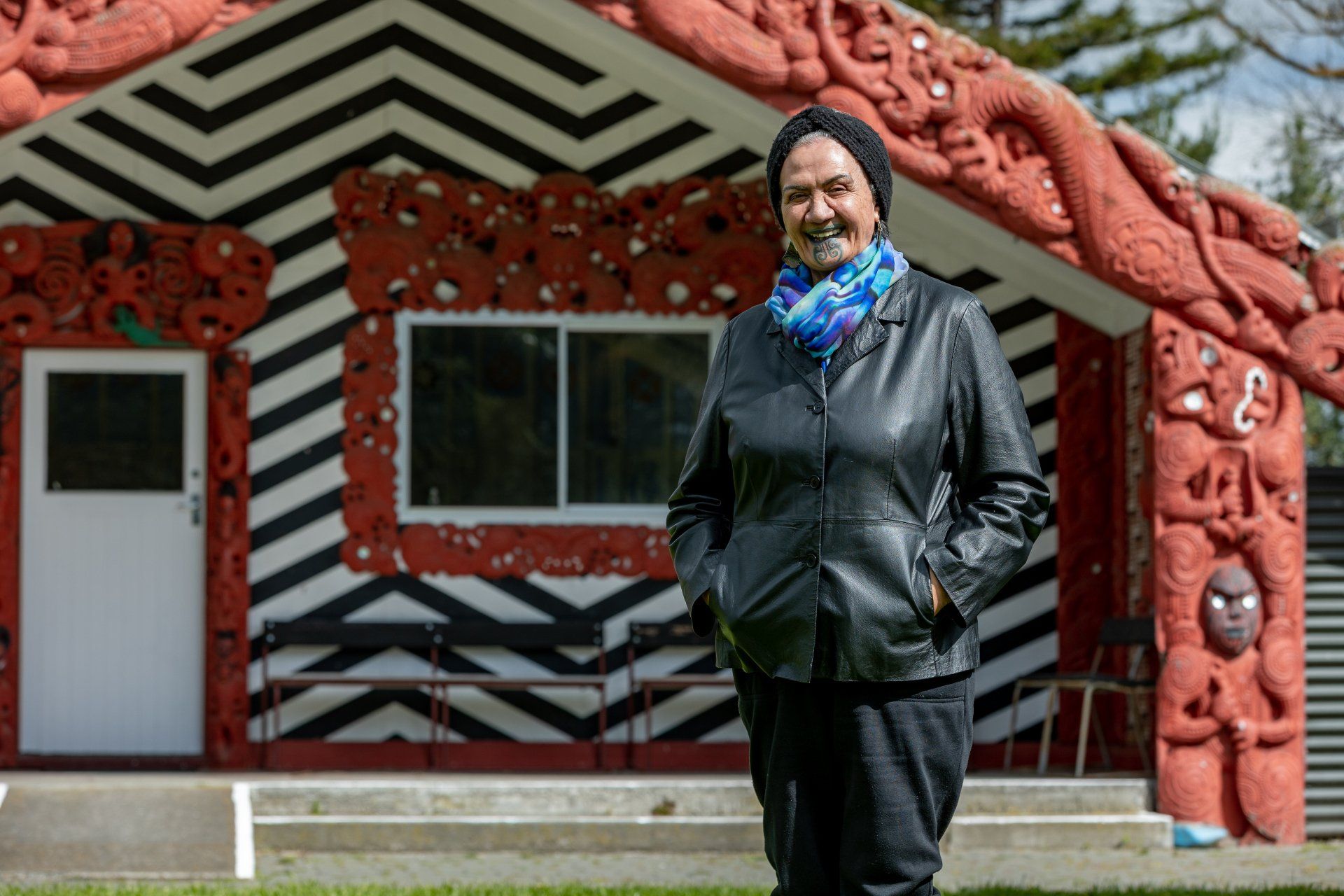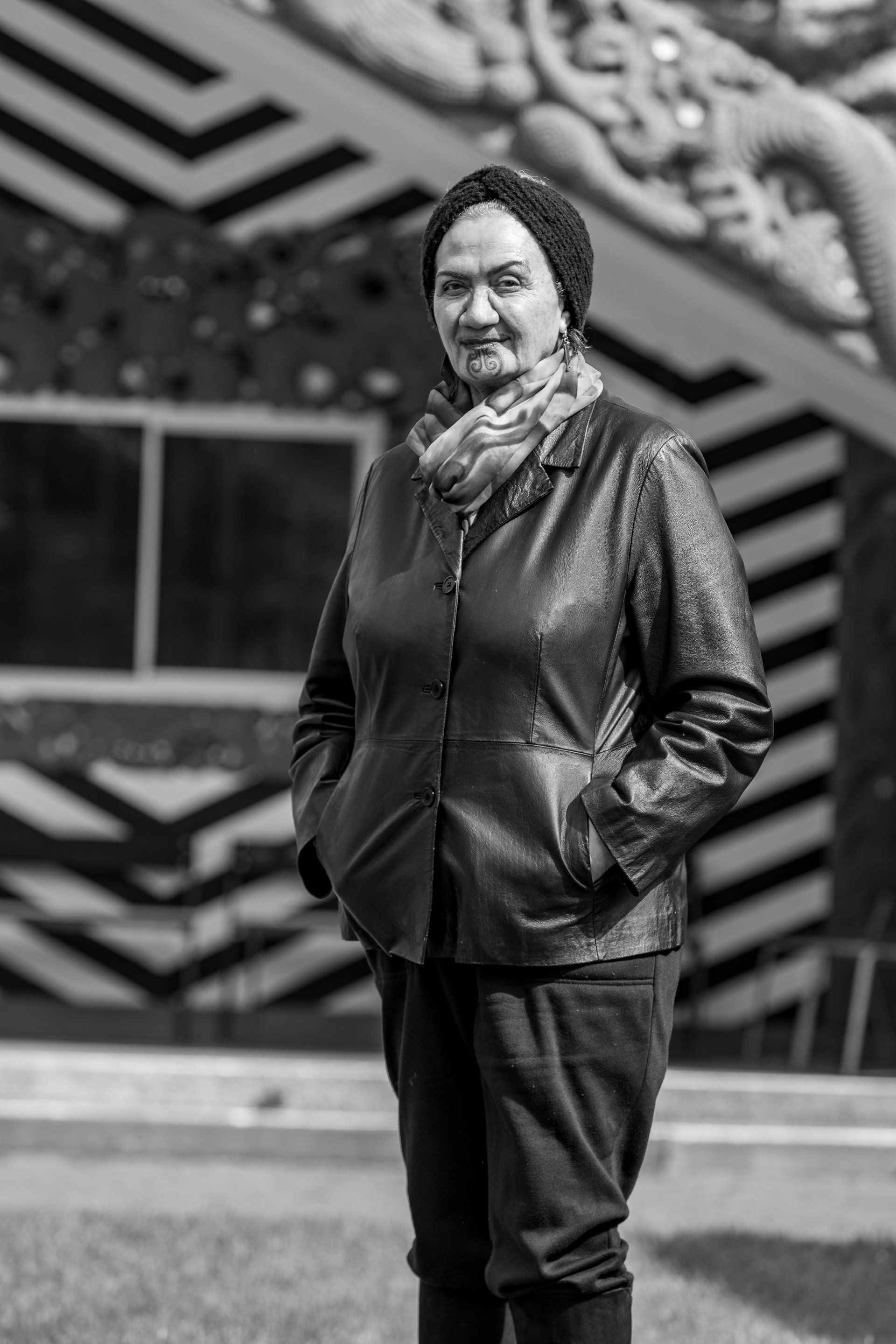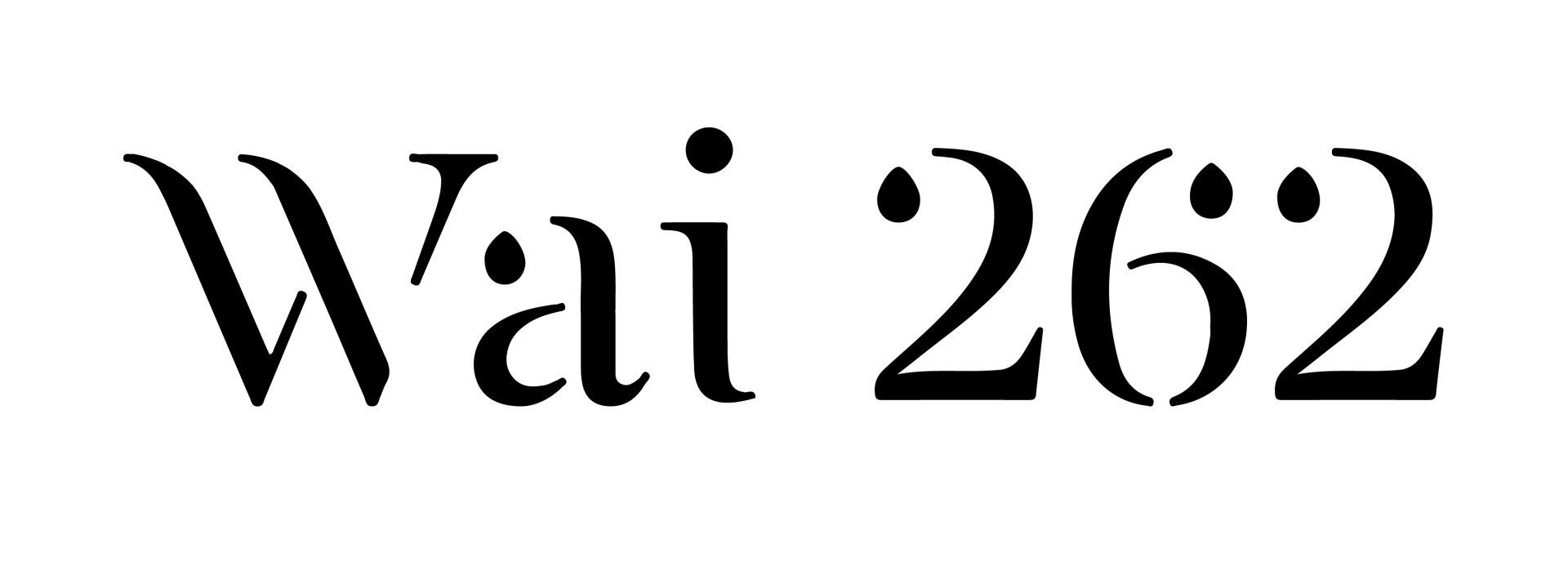
Photo: Ngatai Huata, Waipatu Marae
Photographer: Josie McClutchie
"I asked him (David Lange, Prime Minister at the time) who gave the Labour Government consent to use Pōkarekare Ana as their Campaign Brand?” Ngatai Huata
NGATAI HUATA
Kahungunu ki Te Wairoa, Ngāti Pāhauwera,
Kahungunu ki Heretaunga, Ngāti Porou
Grand-daughter of:
Kuini Ripeka Akuhata-Brown Ryland ka moe i a Paraire Henare Tomoana
Ropine Aranui Huata ka moe i a Hemi Pititi Pareiha Huata
Daughter of:
Te Amorangi Canon Wiremu Wi Te Tau Huata ka moe i a Ringahora Hēni Ngākai Ebel Tomoana
In the DNA, in the Whakapapa
It may come as a surprise to some to hear Ngatai say, “through my grandfather Paraire Henare Tomoana, te taha o tōku Māma, we have inherited his love of pūoro waiata in composition in diatonic scale and kupu Māori songs. Through Wi Te Tau Huata – the whanau are also renowned composers, song-writers, and singers, of Traditional Māori Music, – chanting quarter tone scale – Mōteatea. Musquartertone Kaihaka and producers. You could say, and you would, Ngatai was born into pūoro, waiata, himene, karakia, but further attributes her music songwriting and composer skills, as inherent in her DNA from her tīpuna, through her whakapapa from Te Tohunga Ruawharo and Te Tangata Tamatea Arikinui, of the Waka Tapu o Takitimu, down through the generations.
A life of kaupapa Movements
Listening to Ngatai, one can be struck by her life as a life of “movements” of creating spaces and places for, of, and with kaupapa Māori, a life pursuant of, in her words, “Mana Māori Motuhake.”
She smiles as she says, “We loved being Māori, being ourselves,” and she and others created safe places for Māori to enjoy being themselves when the system’s were not ‘cutting’ it. Places such as the Hikoi Movement Te Tiriti o Waitangi - Tino Rangatiratanga,
Te Kākano o te Whānau
for Wāhine Māori and their whānau, domestic violence, sexual violence and whanau community support would later became their record label - TWM records.
By the time Ngatai set up their own record label Tautoko Wāhine Māori Records, (TWM Records) she had composed up to 50 waiata, himene, haka and wānanga, which later included another 100 plus waiata - a film soundtrack and 24 albums.
It was in 1983, through Tautoko Wāhine, Tautoko Whānau that they set up a kaupapa Māori Pūoro Waiata Collective called Black Katz. They were (and are) trailblazers of kaupapa pūoro waiata and kaupapa waiata with songs such as Aotearoa, Kaua e Mataku, Iwi, Tama Tū Tama Ora, Tama Moe Tama Mate, W.A.R.N – Women of All Red Nations, Iwi, Wahine Atua, Wāhine Ma, Tū Ahurewa, Ngā Mea Katoa, Te Tiriti o Waitangi Tangata Whenua, Tikanga Treaty, and Devolution.
Black Katz produced six albums and the waiata are all owned by the wāhine who wrote the waiata, Te Kaihanga, their tipuna, their whānau, tamariki, mokopuna, me ngā uri e heke mai nei. Black Katz Kaupapa Music had four roles and functions; to Educate, to Conscientise, to Decolonise and to Heal.
Challenging David Lange
During the 1984 National Elections “David Lange came here to Pāharakeke (Flaxmere) to hold a Labour Government Campaign Community meeting,” she adds, “I really liked him – he reminded me of PM Norman Kirk. Following his kōrero, they opened the floor for questions, and you know us colonised Māori, we have lost the ‘art’ of asking the rhetorical question and instead have turned the pātai into a statement of Claim!” I asked him who gave the Labour Government consent to use Pōkarekare Ana as their Campaign Brand?”
She recalls that the community centre was packed, especially with tauiwi. She said that this Koroua Pākehā got up and said “Oh Mr Lange, she can’t say that about ‘pou kary kary aana’, it belongs to all of us New Zealanders.” Laughing, Ngatai said she thought that “it was such irony, that even tauiwi loved Pōkarekare Ana.” and claimed ownership … typical!!
David Lange, appeared uncomfortable, then in response he said that he was a Lawyer who worked primarily with Intellectual Property Rights (IPR), Copyright, Trade Marks etc. and shared that IPR ownership lasts for 50 years after the demise of the writer, composer, and then becomes part of the public domain. Ngatai already knew that - having been a registered APRA (is a copyright collective representing Australian and New Zealand composers) member from the age of 20 years.
Her response? “Well Mr Lange, there is another 15 years yet to run on that (ownership) from when our grandfather passed away.” Lange then suggested that Ngatai contact Malcom Black, a top IPR lawyer in the country at the time. Ngatai did in fact get hold of him and spoke to him, about ‘Pōkarekare Ana’ and about their Grandfather Paraire Henare Tomoana being acknowledged for his waiata tira, waiata-a-ringa compositions and his pioneering of the action song- waiata -a-ringa, She said I wanted to ensure that our grandfather, Papa Paraire Tomoana is acknowledged for his compositions and the contribution he has made to Aotearoa – New Zealand and world-wide.
Malcolm Black replied to her that ‘Pōkarekare Ana' was one of the most iconic songs to come out of this country, New Zealand, it is going to be very hard to prove that. He said that it would take years in court and at that time he didn't have the time, and it would also cost a lot of money and time to make that IPR Claim. Ngatai’s response was the same, “Well I don’t have the time nor the money either” Not to be stopped she moved on.
Claiming Pōkarekare Ana
“It was the first ever case of its kind submitted to APRA, it was submitted by NZ APRA – Manager Bernie Darby, to the Southern Hemisphere APRA / AMCOS Board whose ‘matua’ Board base is based in North Shore, Sydney – Australia. Their Board accepted it. It was not about arguing who owns it. No, no, no, claim it and put the onus on others to challenge it.”
Through this time, Ngatai considered Bernie a good friend, and their koha to him, their Pūatatangi Te Waka Toi committee went to help him identify the waiata sitting in the APRA archives and who the Māori writers composers were of those waiata.
Along Came Wai 262
That was her life for 40 plus years and then along came the Wai 262 claim.
Ngatai gave evidence at her mum’s marae, Waipatu Marae, in the Tamatea Sports Club At that Wai 262 hearing there were several other Kahungunu claimants whose submissions and evidence was about Intellectual Property Rights (IPR), emphasising, “We need to have our own IPR, but that it is Cultural and Creative Rights.”
At that hearing Judge Joe Williams, the presiding judge, asked Ngatai what vehicle or platform perhaps would be best utilised to protect Iwi own property rights, Ngatai’s response was, "For us of Ngāti Kahungunu - we need take the word property out, that is a Pākehā thing, for us it is cultural and creative rights protection mechanisms.”
“I want to put all my and our whanau compositions under a kaupapa Māori, an indigenous model. That is why we have to be in this claim, to reclaim to protect our reo, our kupu, our kōrero, our wānanga, our compositions, our creativity. We have to have our own protections of our Mātauranga Māori, and for us - our Waka is the vehicle. Our Mātauranga Māori was brought here from the South Pacific to Aotearoa, on the Hekenga of our Waka Tapu – Takitimu.”
“Nō reira, kati nei rā te wā o te whawhai, o te amuamu o te raruraru. “No, no, no, ānei rā, we have talked the kaupapa pūtake – the issues. It is time for solutions, we have come up with our own solutions, the Protection of our Cultural and Creative Rights”. – Te Waihanga Te Auaha. Kia haumaru i ō tātou Mātauranga Māori. WAI 262”.



